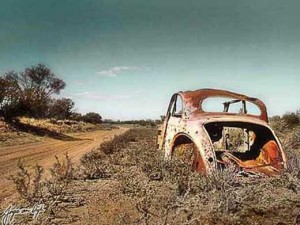
New bill would offer up to $5,000 in tax credits for trading an old car in on a new one -- though this clunker may not qualify.
It’s officially known as H.R. 1550, or the CARS Act, though you might as well call it cash-for-clunkers. Whatever the name, the proposed House measure, given a boost by President Barack Obama, during his Monday speech, could help kick-start the American automotive market.
The measure is designed to provide cash incentives of up to $5,000 for those who trade in a vehicle at least eight years old on a select list of fuel-efficient products produced in North America. The legislation, as initially proposed, would offer the biggest tax credits for U.S.-made vehicles, though products made in the NAFTA countries, Canada and Mexico, would also qualify.
Similar legislation failed to catch fire, in recent months. A similar cash-for-clunkers proposal failed to make it into the final White House economic stimulus package. But with U.S. auto sales continuing to plunge, and the prospects for Detroit’s makers, in particular, worsening, there’s growing support on Capitol Hill. House Speaker Nancy Pelosi is reportedly lending her backing, and President Obama belatedly offered his own support, on Monday.
“Such fleet modernization programs, which provide a generous credit to consumers who turn in old, less fuel efficient cars and purchase cleaner cars have been successful in boosting auto sales in a number of European countries,” he declared. “I want to work with Congress,” he added, “to identify parts of the Recovery Act that could be trimmed to fund such a program, and make it retroactive starting today.”
Under H.R. 1550, a tax credit would only be offered to those trading in on an approved vehicle costing less than $35,000. At this point, manufacturers who would have at least some products covered would include General Motors, Chrysler, Ford, Honda, Hyundai, Mazda, Mitsubishi, Nissan, Toyota, and Volkswagen.
The bill, like similar plans that would lead consumers to scrap old cars, has generated strong support in Detroit. “We’ve been a proponent of scrappage programs…because we’ve seen the success,” says Fritz Henderson, the new CEO of General Motors. “The impact in Germany has been very positive” he notes, with sales rising as much as 20 percent. “We’re enormously supportive of any program that can bring consumers into the equation.”
Not everyone is quite so upbeat, however. Some observers, including environmentalists, argue against H.R. 1550, as currently written, because it would exclude some of the cleanest most fuel-efficient vehicles, including the Japanese-made Toyota Prius hybrid.
The program is also being criticized by those on the repair side of the auto industry. The Automotive Aftermarket Industry Association issued a press release, following Pres. Obama’s comments, asserting that the Cash-for-Clunkers bill would “threaten jobs in the independent aftermarket industry by removing repair opportunities for vehicles and raising the cost of used cars and parts.”
Exactly how much the proposed program would cost is unclear, though would likely run several billion dollars, according to various reports. Finding the source of that money, in the current economic environment, may prove the biggest obstacle to passage.

CARS almost sounds too good to be true…
Perhapas our “Green Weenies” should get off their high horse’s and aim their wrath at TOYOTA:RE THE PRIUS. Tell’em to: “BUILD THE DAM THING HEAH IN THE U S OF A”.
As a “certified “carnut” have been shopping for a Porsche Carrera “Cabrio” albeit “used”. Now with the CARS BILL: NEW PLAN IS: TRADE IN MY “RUSTY” 81 ZX FOR:(drum roll pleez)A SATURN SKY WITH SUPERCHARGED 2 LITRE 4VTC ENGINE, 6SPD, LIMITED SLIP, TRACTION CONTROL, ABS ET AL.
AND IT’S MADE JUST UP THE ROAD A WAYS TOO. (I THEENK, OR IS IT MARYLAND)ADD: 0% INTEREST, 0-60 IN 5 SECS & CHANGE,27 MPG, 30 GRAND PRICE TAG: SIGN ME UP…
DAS ADLER IN DIXIE
Is this plan to be a tax credit which may reduce the taxpayer obligation on April 15 but does not immediately help those consumers who are unable these days to obtain a large enough car loan to cover the full cost of the new car, and still requires the consumer getting rid of his clunker to prove to IRS that the car has indeed been junked and not sold to another driver. I have also seen reference to a “voucher” plan which could solve the consumer’s cash-flow problem, but creates its own administrative difficulties. Would vouchers be expanded versions of the familiar cents-off coupons that enable eligible consumers to reduce cash outlay at the check-out counter for specific product purchases during specific time periods? Or would they be like some manufacturer rebates to a purchaser of an item who submits proof of purchase and receives a check back weeks later. Who in what government office then audits the subsequent transmittal of those vouchers and all other documents to ensure that the trade-in and purchase have met all of the requirements of the law and regulations before governmental checks for several thousand dollars could be disbursed?
Just forget about the pros and cons. Have the congress pass the bill in order to help keep some people employed and start selling vehicles and above all it will reduce the air pollution in our major cities. Cleaner energy is the name of the game.